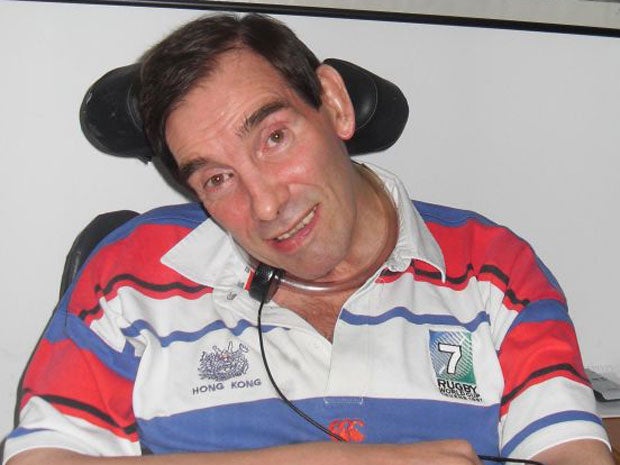
Tony Nicklinson has been paralysed from the neck down and able to communicate only by blinking since he suffered a catastrophic stroke seven years ago.
Yesterday three High Court judges rejected his appeal to be legally helped to die at home, in his own country. Only Parliament can make such a momentous change to the law, they said.
For Mr Nicklinson, 58, who has locked-in syndrome, the disappointment and anger at the court's decision was clear. He must now take his fight for what he believes is his basic human right to the higher courts, despite constant pain and discomfort.
"Judges, like politicians, are happiest when they can avoid confronting the real issues and this judgment is not an exception to this rule … this means yet another period of physical discomfort, misery and mental anguish while we find out who controls my life – me or the state," Mr Nicklinson said.
Mr Nicklinson and a second man known as Martin, 47, mounted separate legal challenges in attempt to secure immunity from prosecution for any professional who helped them to die. Both cases were heard by the High Court in June.
The men can only move their eyes and eye lids yet remain cognitively sharp. Both want to die but neither is capable of taking his own life. Lawyers acting for Mr Nicklinson, whose quest is supported by his wife and two daughters, argued for an extension to the common law defence of "necessity" for murder because the alternative – forcing him to stay alive – is worse. They also argued that the Government is in breach of his Article 8 right to "privacy, dignity and autonomy", which he cannot exercise independently because of his disability.
The court rejected the "bold" submission, saying it had no precedent and that such socially controversial changes were for Parliament alone to make. The decision was welcomed by medical leaders and religious groups, fearful that any change to the law could prove dangerous for elderly and disabled people.
Martin, who also suffered a stroke, tried to get the Director of Public Prosecutions to amend guidance on assisted suicide. Had he succeeded, a doctor or lawyer would not face criminal or disciplinary action for helping him end his life by taking him to the Swiss clinic Dignitas. Martin cannot fulfil his wish to end his life as his wife, a nurse and carer, is not willing to help him do so.
The three judges, who said the court had been "deeply moved" by both men's circumstances, ruled that such matters were for Parliament, not the courts, to decide.
Debbie Purdy, who has multiple sclerosis, wanted her husband to be legally allowed to accompany her to the Dignitas clinic. In July 2009 the Law Lords ruled for her and the DPP had to issue fresh guidelines. In 2002, Diane Pretty, a motor neurone sufferer lost her appeal at the European Court of Human Rights for her husband to be allowed to help her die. Tony Bland was left in a persistent vegetative state after the Hillsborough disaster. In 1993 his NHS Trust won legal permission to withdraw food and fluids.
Subscribe to Independent Premium to bookmark this article
Want to bookmark your favourite articles and stories to read or reference later? Start your Independent Premium subscription today.

Join our commenting forum
Join thought-provoking conversations, follow other Independent readers and see their replies